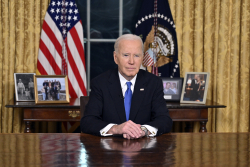The obstacles to reaching an accommodation with Russia may be prompting Trump to take a more conciliatory path in the Middle East.
President Donald Trump’s efforts to achieve a peace deal between Russia and Ukraine appear to have come to a standstill. His tone toward Moscow has become increasingly testy as the Kremlin ups its missile strikes on Ukraine rather than seeking a genuine ceasefire. Indeed, Vice President J.D. Vance, speaking at a Munich Leaders Conference in Washington on Thursday, indicated that he had “not yet” given up hope but observed that he thought that Russia was “asking for too much.”
But the very obstacles to reaching an accommodation—namely, Russia’s desire to crush Ukraine as a sovereign nation—may be prompting Trump to embark upon a more conciliatory path when it comes to tariffs and the Middle East. Until now, Trump, for all his vaunted prowess at cutting deals, has been the Mr. Micawber of American presidents, operating on the credo that “something will turn up.”
With the announcement of his tariff deal with the United Kingdom, however, Trump can present, or at least claim, a victory in his dealings with a foreign leader. In this instance, both the British prime minister and Trump badly needed a win. Ever since its dunderheaded decision to embrace Brexit, Great Britain has been declining economically, while Trump has talked a big game on tariffs ushering in a new golden age for America, but he has been unable to conclude any agreements. Trump declared that the agreement is “a full and comprehensive one that will cement the relationship between the United States and the United Kingdom for many years to come.”
What about Iran? Here, too, Trump and Vance are taking an accommodating stance. Vance stated at the Munich meeting that talks between Iran and America are “on the right pathway” and that Iran could retain a “civil nuclear power program.” Vance even floated the notion that Trump would seek to “reintegrate Iran into the global economy.” Any such agreement would come as a distinct disappointment to the phalanx of hawks in Washington, DC, not to mention Israeli prime minister Benjamin Netanyahu.
But Israel must tread carefully with the Trump administration. The ties that bind remain strong, but there are undercurrents of tension. A recent Gallup poll showed that more Americans are becoming disaffected with Israel. Only 46 percent of adults expressed support for Israel—the lowest number in twenty-five years—and 33 percent indicated that they sympathized with the Palestinians. In the American Conservative, Brendan Buck also offers a reminder that “there is a long history of conservative skepticism about cheek-by-jowl U.S.-Israel relations.”
Considerable ferment exists in MAGA world about those relations; Trump himself will always pursue what he perceives as his own interests first. Unlike Joe Biden, who had a sentimental attachment to Israel, Trump proceeds on the gelid Palmerston principle: “We have no eternal allies, and we have no perpetual enemies.”
Writing in the Jerusalem Strategic Tribune, Ahmed Charai thus sounds an important note of caution about the relationship between Jerusalem and Washington. “In the US, support for Israel among key institutions remains strong,” Charai notes. “But the war has complicated the message. At a time when American leaders are focused on domestic priorities, Israel’s broader leadership – not just its government – has struggled to make its case clearly in Washington.” Charai’s point: Israel should not take America for granted. Netanyahu would do well to heed it.
About the author: Jacob Heilbrunn
Jacob Heilbrunn is editor of The National Interest and is a nonresident senior fellow at the Atlantic Council’s Eurasia Center. He has written on both foreign and domestic issues for numerous publications, including The New York Times, The Washington Post, The Wall Street Journal, Financial Times, Foreign Affairs, Reuters, Washington Monthly, and The Weekly Standard. He has also written for German publications such as Cicero, Frankfurter Allgemeine Zeitung, and Der Tagesspiegel.
Image: noamgalai / Shutterstock.com















